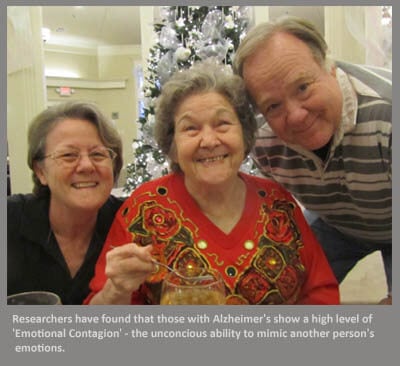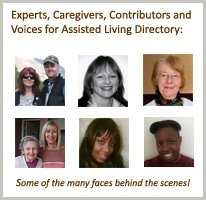Caregivers' Attitude Matters to Alzheimer's Patients

Summary: Alzheimer’s patients can sense what is going on in the world around them, and the attitude of caregvers is just as important as attending to their physical needs. When choosing an assisted living facility or residential care home, make sure to choose one where the staff is competent, but also loving, positive and caring.
Written By: Linda Brendle exclusively for Assisted Living Directory
Alzheimer’s patients are disconnected from the real world, so what goes on around them doesn’t matter much. As long as their physical needs are taken care of, that’s all that’s necessary. Right? Not according to an article by Virginia Hughes titled With Alzheimer’s Comes Empathy.

Hughes cites a study published in the Proceeding of the National Academy of Sciences: “Researchers found for the first time that Alzheimer’s and Emotional Contagionindividuals with Alzheimer’s show a high level of ‘emotional contagion’, the unconscious ability to mimic another person’s emotions.” She goes on to quote the lead investigator Virginia Sturm who says, “As the disease progresses… [patients] become more sensitive – and more vulnerable – to the feelings, words, and behaviors of other people….A caregiver’s emotional state can really influence the patient.”
I was somewhat aware of this phenomenon while caring for Mom but not enough to verbalize it. Had I been more aware, I might have made a more conscious effort to adjust my attitude, especially in her presence.
In the early days of her stay with me, she often followed me into my home office, sitting in the chair across the desk, staring at me with intense concentration. I didn’t understand what she wanted, and her persistence irritated me. After reading Hughes’ article, I realize she was probably looking for a clue that everything was okay, for reassurance that the caregiver who helped keep her chaotic world on track wasn’t angry with her. When the phones were ringing and the customers were unhappy, I was too stressed to be very reassuring, but in my more sensitive moments, I offered a smile, a hug, and an I love you, and she went happily back to watching TV with Dad.
As I moved on in the process of grieving her gradual but inevitable loss, I accepted the reality of her disease and my role in her life. My approach to her became more relaxed, and the love that I felt for her was more evident. She was happier and so was I.
When the time came to choose a residential care facility, my brother did all the legwork while I consulted long distance. After visiting each new facility, he told me about the rooms, the amenities, the activities, the cost – but mostly he focused on the staff. Our final choice had a waiting list, not for new residents but for people who wanted to work there. My first visit reassured me that we had made the right decision.
Every staff member wore a smile, and all of them were supportive and gentle with the residents. Frustrating situations were met with quiet laughter and easy-going assistance, and no one was ever too busy to answer our questions or address our concerns. The most reassuring evidence was Mom’s reaction to her new home. She basked in the warmth of the attention. When a staff member entered her room to change her clothes or take her to lunch, she broke into a big grin and threw her arms open for a hug. She was cooperative and relaxed and never seemed to be afraid.
We were blessed that our first choice was a great fit for all concerned. I hope our experience along with the information from Hughes’ article helps someone else in making a wise choice when looking into assisted living.
Remember – look for a staff that is not only well-qualified and efficient but also positive, loving, and caring..
Copyright © 2013 by Linda Brendle
Article by Linda Brendle exclusively for Assisted Living Directory
Responses to this article:
Comment Soon:
No Obligation
Assisted Living with Caregivers' Attitude Matters to Alzheimer's Patients




